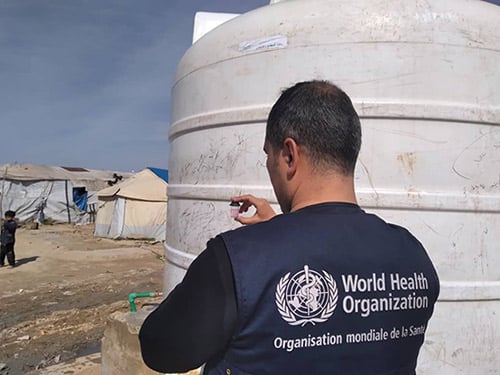WHO Launches Cholera Preparedness and Response in EMRO Region

The World Health Organization (WHO) has unveiled a comprehensive strategy aimed at combating cholera in the Eastern Mediterranean Region by 2028. This initiative comes in response to a significant rise in cholera and acute watery diarrhea cases across several countries, which currently account for nearly 55% of global cholera cases and deaths. The strategy emphasizes a multisectoral approach to address the underlying causes of cholera and aims to protect vulnerable populations, particularly children and displaced individuals.
Current Cholera Crisis in the Region
The Eastern Mediterranean Region is grappling with a severe cholera crisis, particularly in countries like Sudan and Yemen. As of late May 2025, Sudan reported over 65,000 cholera cases and 1,721 deaths across 12 states, with Khartoum State alone accounting for more than 7,600 cases. Yemen continues to struggle with endemic cholera, having recorded over 271,000 suspected cases and 884 deaths since March 2024. Additionally, Syria faces a heightened risk of cholera resurgence, prompting WHO to launch a six-month emergency response targeting 850,000 vulnerable individuals in key governorates such as Aleppo and Damascus. The alarming statistics underscore the urgent need for a coordinated response to curb the spread of this preventable disease.
Strategic Framework for Cholera Control
The newly launched Cholera Preparedness and Response Strategy outlines a clear framework for action, aligning with global initiatives aimed at eradicating cholera by 2030. The strategy focuses on four interconnected pillars: enhancing multisectoral coordination among health, water, sanitation, and emergency actors; improving early warning and detection systems; expanding access to quality case management; and scaling up water, sanitation, and hygiene (WASH) services in high-risk areas. These actions are designed to strengthen the region’s preparedness and response capabilities, ultimately reducing cholera-related morbidity and mortality.
Furthermore, the strategy emphasizes the importance of community engagement and risk communication to foster public awareness and participation in cholera control efforts. It also incorporates measures to address issues such as sexual exploitation and abuse, ensuring that gender equity and inclusion are prioritized in the response.
Challenges to Implementation
While the strategy presents a robust plan for cholera control, its successful implementation faces several challenges. The ongoing humanitarian crisis in the region, coupled with competing health priorities and chronic underfunding, complicates efforts to combat cholera effectively. Limited human resources and fragile health infrastructure further hinder progress. Additionally, there are global shortages of essential cholera supplies, including vaccines and rehydration therapies, which are critical for managing outbreaks.
To ensure the strategy’s effectiveness, WHO plans to conduct annual performance reviews and a mid-term assessment to monitor progress and adapt the approach as necessary. Dr. Hanan Balkhy, WHO Regional Director for the Eastern Mediterranean, emphasized the need for collective action and sustained investment to address systemic inequities and build resilience in vulnerable communities.
A Call for Collective Action
Dr. Balkhy highlighted the preventable nature of cholera, urging immediate and coordinated action to combat the disease. She described the strategy as not just a health intervention but a call for leadership and solidarity among nations. Ending cholera in the Eastern Mediterranean and beyond is achievable, but it requires a unified effort to tackle the root causes of the disease and protect those most at risk. The WHO’s new strategy serves as a crucial step towards safeguarding public health and preventing future outbreaks in a region that has become increasingly susceptible to cholera.
Observer Voice is the one stop site for National, International news, Sports, Editor’s Choice, Art/culture contents, Quotes and much more. We also cover historical contents. Historical contents includes World History, Indian History, and what happened today. The website also covers Entertainment across the India and World.

